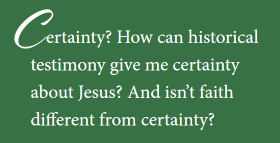December 8

The Certainty of Christmas
I . . . decided to write an orderly account . . . so that you may know the certainty of the things you have been taught. Luke 1:3,4
We will better understand Luke here if we look for a moment at a thinker with utterly different convictions, Gotthold Ephraim Lessing (1729-81).
Lessing was a champion of reason in the Age of Enlightenment. He held that there is an “ugly, broad ditch” between history and religion. By religion he meant a life of love based on principles that reasonable people can discover for themselves and know with certainty. But he found no certainty in Christianity with its foundations in the distant past and its reliance on miracle stories.
Lessing said that if he could see miracles with his own eyes, that would be convincing, but he didn’t trust miracle stories from long ago. He was similarly dismissive of dogmas about God based on biblical claims that God revealed himself in the past. Try as he might, Lessing couldn’t leap from Bible history to the kind of religion he felt he could be sure of. The ditch was too wide.
But the ditch is not too wide for God. He has built a bridge. One end is firmly planted on the bedrock of sacred history, the inspired record of God’s self-revelation, his promises, and his miracles going back to the beginning. The bridge itself is Jesus Christ, the Son of God born in Bethlehem, in whom God has entered human history in the most profound and personal way. The other end of the bridge brings us, not to the stripped-down, reasonable religion of Lessing, but to life with God in this world and the next through faith in Jesus.
Luke’s heart was mastered by this reality of God at work in history to fulfill his plans and promises. Recognizing the value of sacred history, he wrote both a gospel and the book of Acts. Luke did not naively suppose that his accounts of miracles would convince everyone; he knew that even seeing a miracle would not win over those who close their ears to God’s Word (Luke 16:27-31). But he also knew that the only kind of religious certainty that matters is the certainty God gives through a gospel message that is rooted and realized in history. As Luke tells us, he writes the story of Jesus “so that you may know the certainty” of Christianity.
Dear Father, use the Bible’s sure, historical message about Jesus to keep us sure as we trust and serve you. Amen.
Rev. Joel Fredrich serves Martin Luther College as a professor of Greek.





